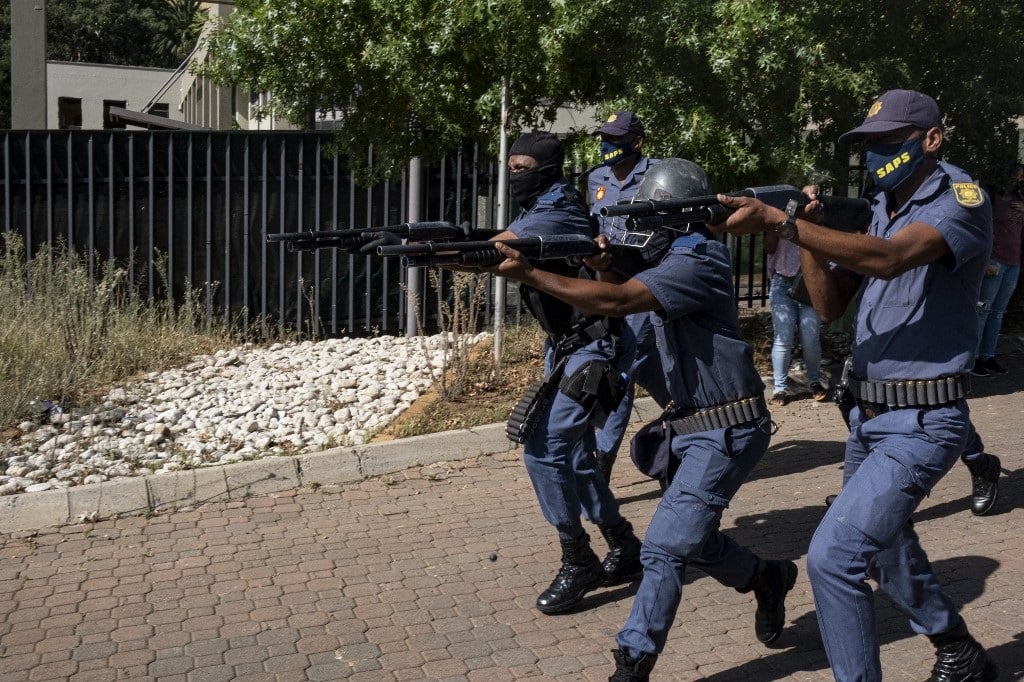
The private security industry will have to be drastically reduced or even abolished if we want to create a society that does not allow the rich to simply buy safety at the expense of the victimisation and brutalisation of others.
This is according to independent researcher and author Ziyanda Stuurman, who wrote Can We Be Safe? The Future of Policing in South Africa.
Stuurman said:
She was speaking on the subject of abolition or reform of the current policing system in South Africa at a webinar hosted by the C19 People’s Coalition Anti-Repression Working Group on Wednesday.
In answering the debate question on whether there is a future for the police in South Africa, Stuurman made reference to the Freedom Charter as a guideline on the progress that the policing system has made since its formation: “The assertion that the home is a private space that should not be repeatedly encroached on by the police is sadly a point that has to be made 66 years later in South Africa, after attempted insurrection in July this year and the police action that followed it.”
READ: How cops fuel violence
Activist and national coordinator of the Right2Know campaign Axolile Notywala, meanwhile, asserted that much of crime stems from socioeconomic issues such as poor service delivery, unemployment and drug and alcohol abuse, hence police are deployed around crime hotspots to maintain public order. This while factors that instigate crime are ignored.
Notywala said:
Gareth Newham, the head of justice and violence prevention at the Institute for Security Studies, argued that we need to envisage a future South Africa in which we don’t need a large policing and criminal justice capacity because we have addressed the various factors that contribute to our high murder and crime levels.
“The police arrest about 1.5 million people a year, many hundreds of thousands of them poor black men who are not guilty of serious crimes. In this way, it could be argued that the police are managing inequality rather than preventing and reducing crime. That murder has increased by 37% and robbery by 43% since 2012 is evidence of this,” said Newham.
He conceded that we need a new charter that boldly sets out a vision to free us from poverty, inequality, unemployment and high levels of violence, crime and corruption. The current policies and approaches are simply not working.
READ: Building a more equitable South Africa hinges on buy-in from whole of government and all of society
“The widespread public violence in July brought into stark focus how inadequate the state security apparatus is when it comes to preventing and responding to networks and individuals who seek to cause public harm,” he said.
Meanwhile, abolitionist and educator in the department of anthropology at the University of the Western Cape, Kelly Gillespie called for focus on other forms of harm-reduction.
Gillespie said:
She added that the democratic infrastructure project reverts as soon as the state takes on a different character and assumes authority; it moves to remilitarisation to put down protests and keep the status quo.
“What we can do is draw support away from policing to other forms of harm reduction such as street committees and people’s courts, and other African traditions of solving crime.”
WATCH: Saving our Yeoville streets
“Abolition doesn’t ask us to do away with police and leave no alternatives for safety. It asks the opposite: How do we build a society in which people don’t need police because they have their needs met and don’t have to resort to violence to constitute a viable life?”
“It asks how we can deal with harm and violence together without having to use the blunt weapon of policing to fix ongoing problems that simply cannot be fixed with an ineffective and violent police force,” she said.
| ||||||||||||||||||||||||||||||
 |




 Publications
Publications
 Partners
Partners










